I am a big Ace of Cakes fan. The most obvious reason is that I like cake and they make cake. But that can't be the only thing because Cake Boss makes me want to poke myself in the eye. I finally realized that I enjoy Ace of Cakes because it is one of the few examples on television of a happy workplace. Here's what Duff and his team have taught me about good management:
Give staff parameters but be flexible in process and final result. If a client asks for a cake that looks like a tackle box and it needs to serve 50 people, those are pretty clear parameters. Is the tackle box on a wooden dock made out of fondant? Is there a airbrushed cake fish that looks like it ready to jump back into the water? That' up to the staff to decide. The client is happy because the cake is better than their expectations and the cake artist is happy because they were able to make something that was their own creation.
Create an environment of teamwork. You have two hours to finish a cake and it's only halfway decorated. Does everyone say "thank goodness I met my deadlines, good luck to that sucker?" No, they all pitch in to get it done because the organization's reputation is riding on that completed cake and everyone is equally impacted by that. You also want people to be willing to pitch in when you need help, so you don't want to be know as the one who left their teammate holding the cake.
Play to people's strengths but let them stretch. Are you great at making cakes that look like other foods? Fabulous, now create a detailed replica of this apartment building. Stretching yourself and asking your staff to stretch makes sure that people don't get complacent and bored. It also ensures that you have staff with an expanding skills base.
When things get screwed up don't spend time worrying about who's to blame, fix it. Did your co-worker bump into your completed cake and leave an elbow print in the fondant? Great, what a wonderful chance to create a decorative flower to fill that whole. Expending energy on blame just makes it harder to fix the problem and it also takes up a lot of time.
Build'em up. All of the staff on Ace of Cakes spend a lot of time admiring their co-workers creations and the skill that it took to make it. They don't give this praise behind closed doors, they give it in person and they do it so everyone hears. Duff also works hard to pull together fun activities for the staff to do together. It's a hot day? Great, ice cream for everyone. We're working on a cake for cranberry farmers? What a great chance for all of us to get into waders and work in a cranberry bog and have a cranberry fight. These little things lead to a happy staff that are committed to you as a manager and to your organization.
What do you do to create a cake'o'rific working environment for your team?
 [/caption]
If you looked at my list of mentors you would probably be shocked. On that list you would see a couple egotistical jerks, someone that
[/caption]
If you looked at my list of mentors you would probably be shocked. On that list you would see a couple egotistical jerks, someone that  One of my pet peeves is when people and organizations shoot themselves in the foot because the lack the vision to see the big picture. This is especially obvious when it comes to many in the nonprofit sector fighing against a change in the charitable tax deductions of our wealthiest donors to help pay for health reform.
One of my pet peeves is when people and organizations shoot themselves in the foot because the lack the vision to see the big picture. This is especially obvious when it comes to many in the nonprofit sector fighing against a change in the charitable tax deductions of our wealthiest donors to help pay for health reform. Ever since my son was 4 months old, he has been going to the best daycare in the world. I know most parents think their daycare is the best but mine really is and ABC agrees because they just selected our daycare provider for an Extreme Home Makeover! Philanthropy isn't always about what you can do on your own. I would have love to build her a new house but I don't have the resources but by all of the parents banding together and sending in many heartfelt entries to ABC we were still able to have the same result (OK a much, much better result that if we tried to build her a house ourselves).
Ever since my son was 4 months old, he has been going to the best daycare in the world. I know most parents think their daycare is the best but mine really is and ABC agrees because they just selected our daycare provider for an Extreme Home Makeover! Philanthropy isn't always about what you can do on your own. I would have love to build her a new house but I don't have the resources but by all of the parents banding together and sending in many heartfelt entries to ABC we were still able to have the same result (OK a much, much better result that if we tried to build her a house ourselves).